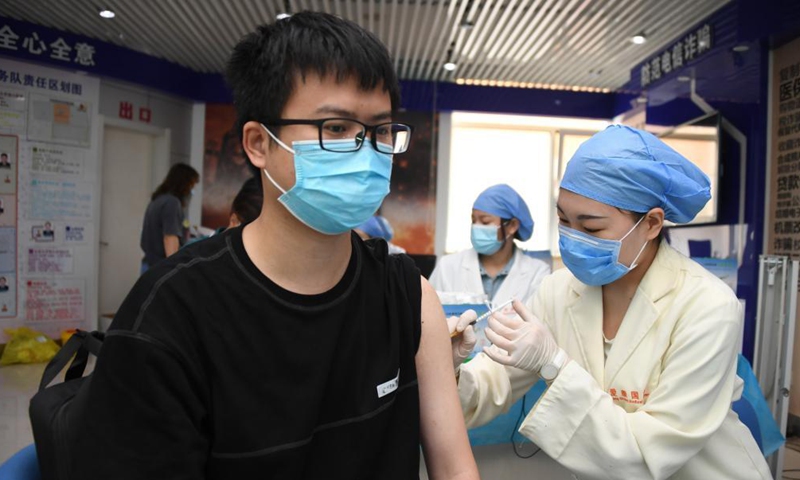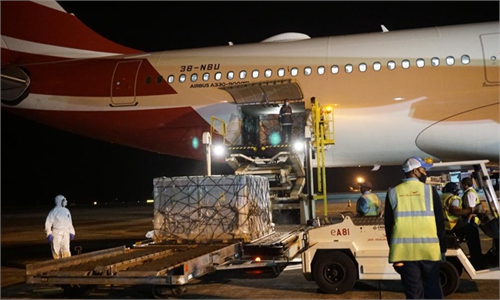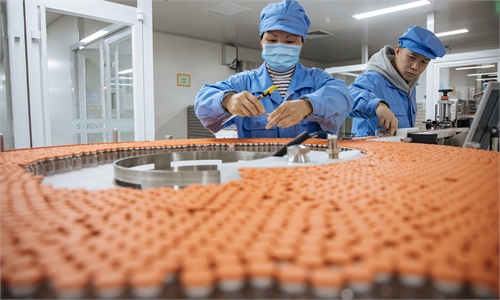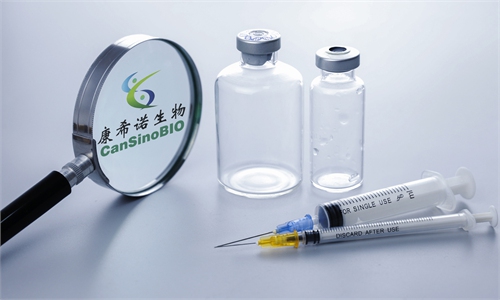China approaches record 500m shots administered, likely to ‘produce 3b by year-end’
National vaccine production likely to surpass 3b doses by year-end: expert

A medical worker administers a dose of the recombinant COVID-19 vaccine (adenovirus type 5 vector) which requires only one shot to a resident at a temporary vaccination site in Haidian District of Beijing, capital of China, May 20, 2021.Photo:Xinhua
China is expected to produce more than 3 billion doses by the end of this year and become the first in the world to have administered 500 million shots of COVID-19 vaccines, despite temporary shortages in some places due to booming willingness to take the shots amid the latest domestic cases.
China has administered the highest number of shots in the world, which, according to the National Health Commission (NHC), reached 497.3 million as of Saturday. That's far more than the second, the US, with 283.94 million doses as of the same day.
The country has witnessed record daily inoculations since early May, following latest the COVID-19 cases in East China's Anhui and Northeast China's Liaoning provinces.
According to NHC, the number of shots administered in China in the past week rocketed from 13.8 million on Wednesday to 17.2 million on Thursday, then dropped to 16.6 million on Friday and 13.9 million on Saturday.
The decline could partially be a result of temporary shortages in some places amid the public's soaring interest in vaccinations. Media reports said that vaccinations in Guangzhou, capital of South China's Guangdong Province, were suspended on Saturday due to a lack of shots.
Some people in Guangzhou have taken to social media platforms to say that they have difficulty in accessing shots, especially those who were eager to get their second shots in time.
To ease public concerns, Guangzhou health authorities announced that a new batch of shots was scheduled to arrive in the city on Sunday, and they told local residents to make reservations to be vaccinated as early as possible.
The Global Times learned from the health authority of Anhui that the province had also seen a temporary supply tension since Thursday, as local people flooded to get vaccinations amid new outbreaks.
But the problem eased over the weekend and the province now has enough shots, the Global Times learned from a source.
Not all the provinces the Global Times reached said that they had supply problems. Health officials in Shanghai, which is about 400 kilometers away from the Anhui's capital Hefei, denied that the city faced such problems despite recent domestic cases.
The Global Times has learned from some local officials, medical workers and experts that vaccine shortages occur now and then in some places, but that is normal while carrying out such a large-scale inoculation drive. Chinese local authorities as well as central authorities have been adjusting to the actual situations to guarantee the inoculation goal.
As Chinese manufacturers gradually expand production, the tight demand-supply balance in the country is expected to ease by the end of June, experts estimated.
Feng Duojia, president of the China Vaccine Industry Association, told the Global Times on Sunday that Chinese manufacturers have produced about 1 billion doses for the world and they aim to raise that to more than 3 billion by the end of year.
Getting from 100 million doses to 1 billion doses only took Chinese manufacturers about five months, and the speed would continue to increase, Feng said, noting that Chinese producers have been making their best efforts to expand output.
The Global Times learned from one of China's major COVID-19 vaccine producers Sinovac on Sunday that it can produce 6 million doses per day and 10 million or more when the demand expands.
China started to launch a national vaccination drive at the end of 2020, starting with people aged between 18 and 59. Now, the country has gradually expanded the program to more groups, such as people aged 60 and above.
Experts said that, alongside the expanding supply and decreasing antibody levels in people who took the shots more than half a year ago, it is likely that China will provide booster injections to those in need.
China has been conducting studies on when and how to enhance the immunity of people who have taken two shots, especially considering the rapid and pervasive mutation of the virus, Tao Lina, a Shanghai-based vaccine expert, told the Global Times.
"It's very likely that people will have to take a booster injection at certain intervals if no new vaccine targeting mutations is created," Tao noted.




